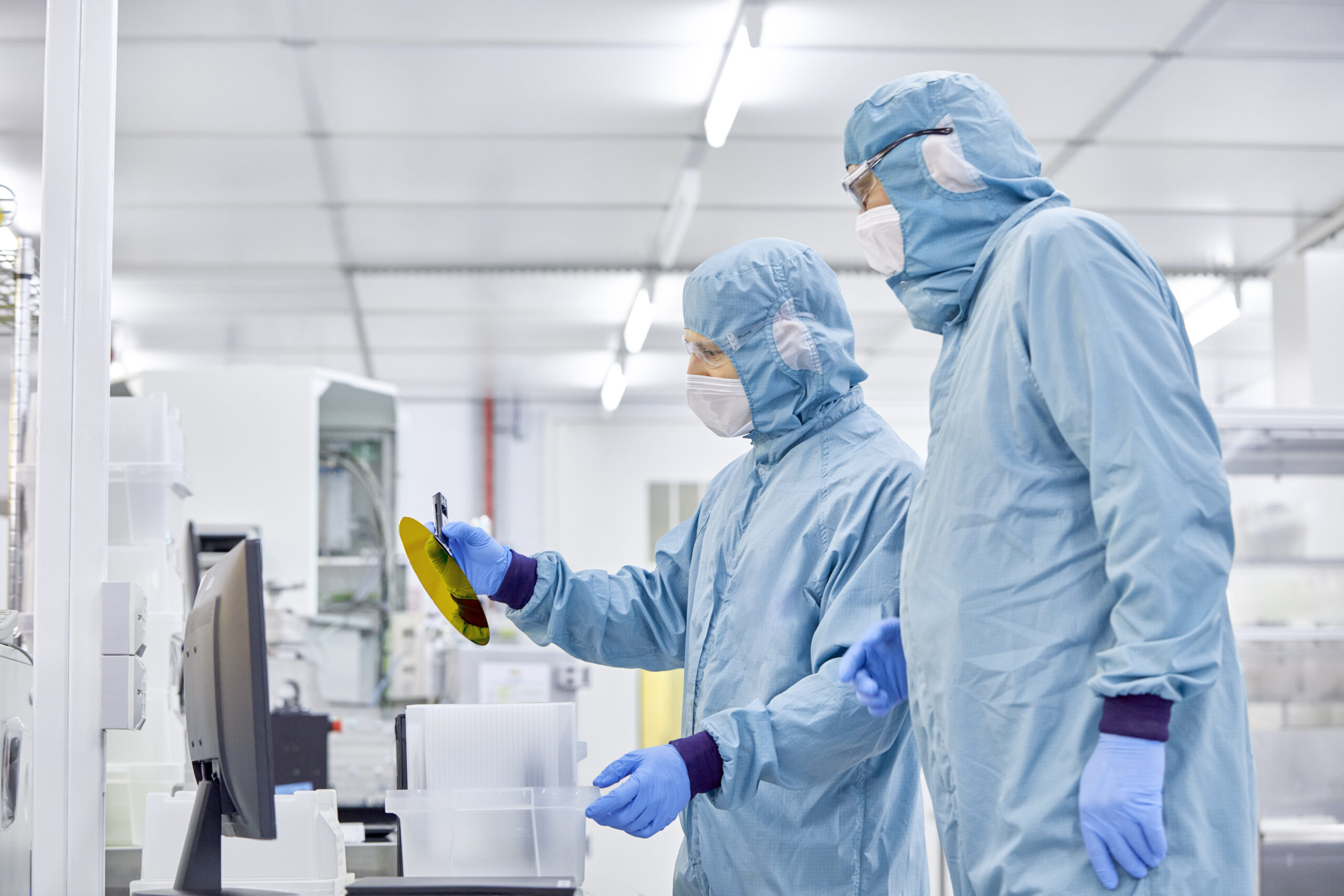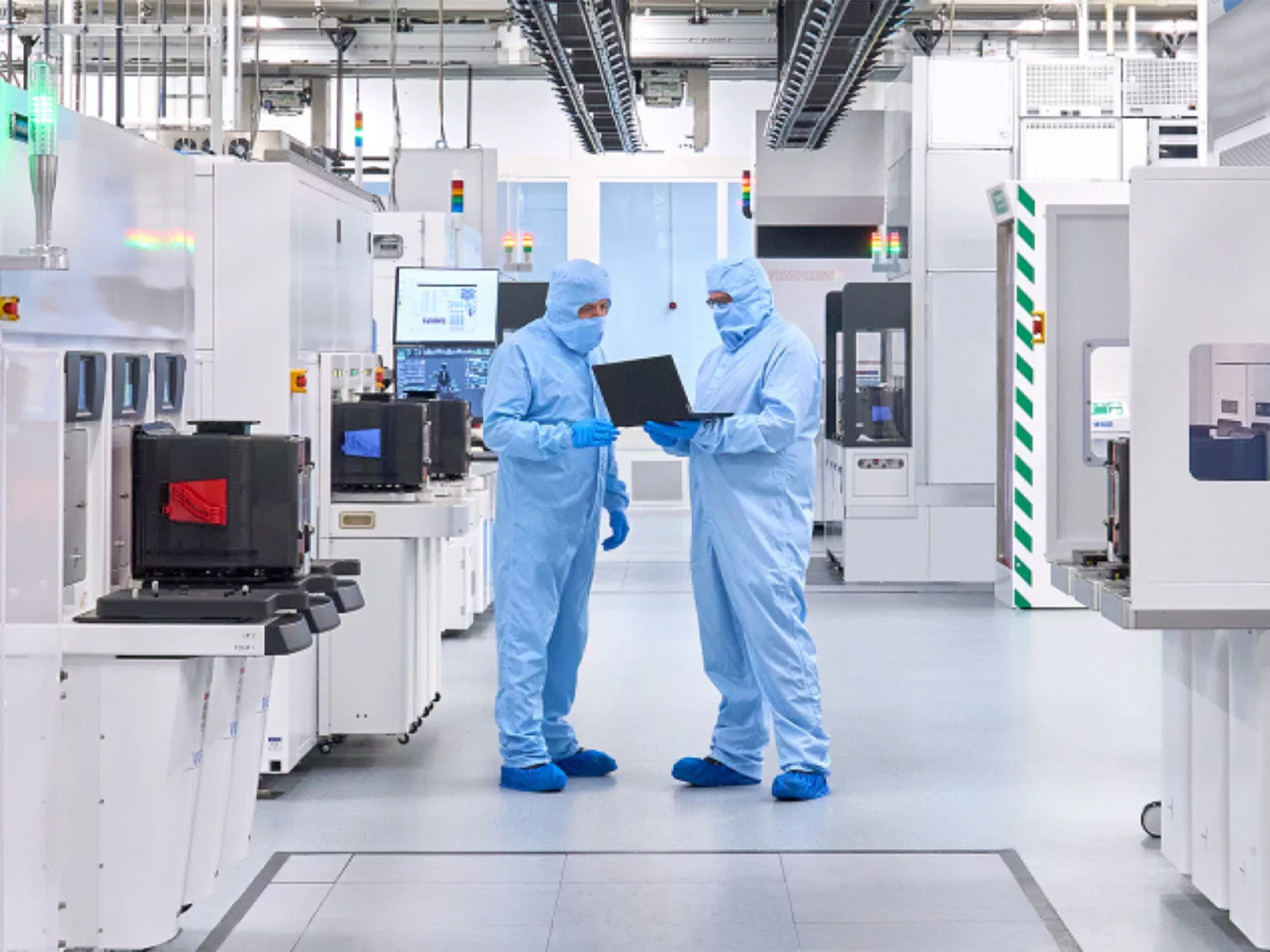The Times | Tom Saunders
1 Apr 2024
Pragmatic approach promises fab benefits for northeast
Semiconductor maker plans to churn out billions of chips every year, while creating more than 500 skilled jobs in the local area

Pragmatic Semiconductor is the first company to produce chips with a diameter of 300mm in Britain
It was a familiar if unwanted sight for northeast England, an empty factory that had been unused for years. Wavin had been based here since the 1980s, employing hundreds of people making plastic pipes for plumbing, drainage and the like, but it had upped sticks in the 2010s. A pragmatic and, if possible, forward-looking solution was required.
It turns out that the answer was, indeed, Pragmatic. The British semiconductor maker of that name chose the old factory as the home of its new fabrication line, or “fab”, the first to produce chips with a diameter of 300mm in Britain.
Last year Pragmatic secured £182 million in financing, the largest venture financing round on record for a European chip company, and last week its facility opened for the first time. If all continues to go to plan, soon it will be churning out billions of chips every year, while creating more than 500 skilled jobs in the local area.
Unlike the chips that form the core of modern phones and laptops, Pragmatic’s technology is intended to be wearable or embeddable. Its chips are thinner than a single sheet of paper and are made of a combination of materials that makes them flexible, unlike conventional products, although this comes with the trade-off that they are far less powerful than their silicon-based counterparts.
The company is already generating revenue from a small number of customers in the packaging industry that are experimenting with how the chips can be used to track products through supply chains, among other things. But they could be used in all manner of products. One use suggested by some at the company is to embed the chips in wine bottles so that merchants can easily verify the authenticity of a particular aged bottle. Some of the more high-end champagne manufacturers already do this with conventional chips, but their brittle nature makes this impractical for all but the most carefully handled products.
“Ultimately, Pragmatic is a platform on which people will develop interesting applications,” said Niranjan Sirdeshpande, the global head of M&G’s Catalyst strategy, which invested £40 million in Pragmatic and led its latest funding round alongside the UK Infrastructure Bank. “Think of the app store and apps. When there is an enabling technology, like the iOS platform, people’s creativity and imagination take over and build stuff that we would never have thought of or imagined.”
Uniquely, Pragmatic’s chips are incredibly easy to manufacture. It takes barely a dozen tools and about two days to make one semiconductor from start to finish. Pragmatic’s fabs are simple to assemble, as well: you need only an upgraded electric grid connection (the kind that most factories already have access to), a basic water supply and 600 square metres of industrial space.

The production line is more or less modular and almost completely automated, generally with only two employees present
In contrast, factories in Taiwan making the chips used for artificial intelligence and modern computers are gigantic. Equipment costs alone reach well into the billions of pounds for a single fab, with hundreds of tools consuming the same amount of water as a small city. They are also energy guzzlers: TSMC, the world leader in advanced semiconductor manufacturing, is expected shortly to be responsible for about 12.5 per cent of Taiwan’s total energy consumption.
So Pragmatic’s new factory is comparatively tiny, but it is also conspicuously empty. The majority of the facility comprises vacant warehouse space. The fab itself is tucked into a corner, hence the company’s name for it, a “fab in a box”, a production line that it is more or less modular, is almost completely automated and can be deployed virtually anywhere. In fact the company can see a time when it fits and run fabs within its customers’ factories, essentially a “fab as a service”, allowing those customers finer controls over their supply chains, a preoccupation for many manufacturers after the global semiconductor shortage that broke out during the pandemic.
“Our current focus at the moment is absolutely building up capacity here and servicing the global customer demand for the technology,” David Moore, Pragmatic’s chief executive, said. “Of course, in time there will be opportunities to localise fab capacity with customers. I think it’s one of the inherent advantages of having that modular, localisable supply is that it gives you options in terms of how you operate it.” The company plans to build eight more of its modular fabs within its Durham warehouse, which would make Pragmatic Britain’s biggest maker of semiconductors by volume.
Pragmatic did not alight upon Durham by chance. Its journey to northeast England was shepherded by the government in what might be considered an example of “levelling up” even before the term was coined.
Like most technology start-ups, Pragmatic has its headquarters in Cambridge and its early employees toiled away on the university’s machines, experimenting with prototype chips. It keeps close links with other Cambridge-based semiconductor start-ups, including Arm Holdings, the powerhouse chip designer, which is a significant investor in Pragmatic. One of Arm’s founders recently joined the business.
However, to properly test its chips it needed to be able to lease equipment on a more long-term basis, so it turned to the Centre for Process Innovation, a government body that helps companies to develop high-tech products by providing access to facilities, expertise and funding. The centre was founded by Tony Blair’s government in 2004 with the aim of repositioning the northeast as a hub for world-class research and development. Four of its seven facilities, including the one Pragmatic used, happen to be situated in Sedgefield, Blair’s former constituency. From Sedgefield, it made sense for Pragmatic to build its first factory near by, with Durham a convenient 20-minute drive away.

David Moore, the chief executive of Pragmatic, is looking forward to the company’s expansion
“It turns out the northeast has got a tremendous heritage, in industry, in semiconductor manufacturing over the years,” said Moore, 47, who joined the company last April from the United States-based Micron Technology. “We have people working with us that have been working the region in semiconductors for 30 years.”
The company’s next challenge, like many of Britain’s promising technology companies, is ensuring access to capital. It has had some success already after the UK Infrastructure Bank decided to open its mandate to include semiconductors, allowing the state-owned bank to take an investment position in the company.
Jeremy Hunt’s Mansion House reforms, which seek to channel pension savings into young and unlisted companies, also were highlighted by Moore as an encouraging sign of things to come. “I think there’s been a lot of progress in the UK,” he said. “We want to be able to keep UK businesses, UK talent and UK innovative technology here for the long term, albeit with international expansion as any successful global company is going to do, but not lose that UK base in the process.”